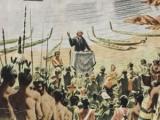For such a symbolic moment, the events of 14 July offered little drama – the first member of New Zealand’s inaugural Parliament, Hugh Carleton, was elected unopposed at Russell in the Bay of Islands.
Bay Of Islands
Events In History
Maketū Wharetōtara, the 17-year-old son of the Ngāpuhi chief Ruhe, killed five people at Motuarohia in the Bay of Islands. In March 1842 he became the first person to be legally executed in this country.
More than 40 Māori chiefs signed a treaty with the British Crown in the Bay of Islands. The Treaty of Waitangi remains controversial.
Darwin's visit to the Bay of Islands on HMS Beagle was brief and unspectacular from his point of view. The Beagle's captain, Robert FitzRoy, would later serve as the second governor of New Zealand.
Samuel Leigh and William White established Wesleydale, a Wesleyan (Methodist) mission station at Kaeo. Leigh was friendly with Samuel Marsden of the Church Missionary Society and the two missions worked closely together.
The American sealer General Gates – named for a War of Independence general and commanded by Captain Abimileck Riggs – had sailed from Boston in October 1818.
At Hohi (Oihi) Beach in the Bay of Islands, Samuel Marsden preached in English to a largely Māori gathering, launching New Zealand’s first Christian mission.
Marion du Fresne’s was the second French expedition to visit New Zealand, following that of Jean François Marie de Surville in 1769. Du Fresne’s acceptance of the philosopher Jean-Jacques Rousseau’s beliefs about ‘noble savages’ was to have unfortunate consequences for him and his crew.
Articles
Missionaries

The Christian missionaries of the pre-1840s have been described as the 'agents of virtue in a world of vice', although they were not immune to moral blemish themselves. Read the full article
Page 5 - Wesleyans and Catholics
How Maori responded to the arrival of Wesleyan and Catholic missionaries in the Bay of
Musket Wars

Thousands of Māori died in the intertribal Musket Wars of the 1810s, 1820s and 1830s. Muskets changed the face of intertribal warfare, decimating some tribes and drastically altering the territorial boundaries of others. Read the full article
Page 3 - Beginnings
The Ngāpuhi chief Hongi Hika is usually seen as responsible for beginning the Musket














